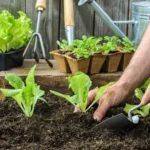Rabbits are common visitors to many gardens, and you might wonder if they’re nibbling on your onions. Understanding what rabbits eat can help you protect your plants and keep your garden thriving. While rabbits are known for munching on leafy greens and tender shoots, their relationship with onions is a bit different.
You’ll be relieved to know that onions aren’t usually on a rabbit’s menu. These furry foragers tend to avoid onions because of their strong smell and taste. Knowing this can help you plan your garden layout and use onions strategically to deter unwanted rabbit visits. Let’s explore why rabbits steer clear of onions and how you can use this to your advantage in the garden.
Understanding Rabbit Eating Habits
Rabbits display specific eating habits that help you anticipate their behavior in your garden. Knowing what they prefer guides your gardening choices.
What Rabbits Typically Eat
Rabbits consume a variety of tender plants, including leafy greens, clover, and garden vegetables like lettuce, carrots, and peas. They target young shoots and bark during colder months. You won’t find rabbits eating onions because their strong flavor and sulfur compounds deter them. Roots, grasses, and herbs also make up their diet, but all avoid allium family plants such as onions, garlic, and leeks.
Why Rabbits Forage in Gardens
Rabbits seek easily accessible, nutrient-rich food sources, which gardens often provide. You can expect them to forage in gardens as they contain tender vegetation and fresh growth. Their constant need for fiber and moisture leads them to nibble on vegetables and herbs during spring and summer. You benefit by recognizing this pattern, allowing for strategic planting of non-preferred species like onions to minimize garden damage.
Do Rabbits Eat Onions in the Garden?
Rabbits generally avoid eating onions in your garden. Understanding their behavior toward onions helps protect your plants and manage your garden effectively.
Are Onions Safe for Rabbits?
Onions contain compounds like thiosulfate that are toxic to rabbits. If a rabbit ingests onions, it risks hemolytic anemia and gastrointestinal issues. You won’t want to feed onions to pet rabbits, and wild rabbits tend to steer clear of them naturally due to the odor and chemical makeup.
Rabbits’ Preference for Onions Compared to Other Vegetables
Rabbits favor tender, mild-tasting vegetables such as leafy greens, carrots, and peas over onions. The strong smell and taste of onions create a natural deterrent. Unlike these preferred plants, onions rarely suffer damage from rabbit grazing, making onions a strategic choice to plant near vulnerable crops.
Potential Risks of Onions to Rabbits
Onions pose significant health risks to rabbits and should never be part of their diet. Understanding these risks helps you protect your pet rabbits and prevent accidental exposure in the garden.
Toxicity and Health Issues
Onions contain thiosulfate, a compound toxic to rabbits that causes oxidative damage to their red blood cells. This damage can result in hemolytic anemia, reducing their ability to transport oxygen efficiently. Even small quantities of onion, whether raw, cooked, or in dried form, increase the risk of severe poisoning. Unlike some animals, rabbits cannot metabolize thiosulfate safely, which makes onion exposure particularly dangerous. Avoid planting onions near rabbit enclosures to prevent accidental ingestion and potential health complications.
Symptoms of Onion Poisoning in Rabbits
Rabbits exposed to onions may show symptoms such as weakness, lethargy, pale gums, rapid breathing, and an elevated heart rate. You might notice loss of appetite or dark-colored urine within 24 to 48 hours after ingestion. Severe cases lead to collapse or sudden death if treatment is delayed. Monitoring your rabbit for these signs after accidental contact with onions helps with early intervention. If you observe any symptoms, contact a veterinarian immediately, as prompt medical care improves recovery chances.
How to Protect Your Garden from Rabbits
Protecting your garden from rabbits requires strategies that reduce their attraction and limit access. Use a combination of physical barriers and plant choices to keep rabbits away while preserving your garden’s health.
Natural Deterrents for Rabbits
Use strong-smelling plants like onions, garlic, and chives as natural deterrents around the garden perimeter. Their pungent aroma makes the area less inviting. Apply commercial rabbit repellents containing bitter agents or predator urine, which create an unpleasant environment for rabbits. Install motion-activated sprinklers or ultrasonic devices to startle and discourage rabbits from approaching. Keep garden debris and tall grass trimmed to reduce rabbit hiding spots. These actions minimize rabbit presence without harmful chemicals.
Growing Rabbit-Resistant Plants
Choose plants that rabbits tend to avoid, such as herbs with tough leaves like rosemary and thyme. Ornamental grasses, lavender, and marigolds also show resistance due to their texture and scent. Incorporate plants with strong flavors or textures, including onions and daffodils, which rabbits rarely consume. Rotating crops and mixing resistant plants with vulnerable crops help diversify your garden and reduce rabbit damage. You maintain a balanced garden ecosystem by selecting plants that naturally repel rabbits while enhancing garden aesthetics.
Conclusion
Knowing that rabbits avoid onions and that these plants can be toxic to them gives you a natural way to protect your garden. Using onions and other strong-smelling plants as barriers helps keep rabbits at bay without harming them.
By combining these tactics with physical barriers and rabbit-resistant plants, you can create a garden that stays vibrant and healthy. Always keep an eye on your pets and garden to ensure everyone stays safe and thriving.

Hi, I’m Md Rofiqul, a gardening enthusiast who loves spending time in the garden and backyard. I enjoy caring for plants, growing flowers and vegetables, and creating a green space that feels peaceful and refreshing. Gardening is more than just a hobby, it’s a passion that connects me to nature and brings joy to my daily life. Living with plants inspires me to embrace simplicity, patience, and sustainability while making every day more colorful and rewarding.

